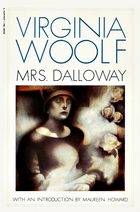I recently joined LibraryThing, an ultra-cool (to me) online service that lets you catalog and tag all your books. They even have a selection of different covers so you can pick out the one that matches your actual copy of the book--and if yours isn't already uploaded, you can scan it in yourself.
There are so many cool things possible with this site, especially for someone who, like me, is interested in book-indexing and library science in general. Because of the tags, I can now pull up a list of all my books that feature first-person narrators, all works involving father-daughter relationships as a main theme, or all those which are instructional in nature (cookbooks, knitting patterns, etc.). I can see easily how many Modernist works I own versus how many Victorian works, how many works that I consider to be "witty," and how many that are concerned with mental illness.
The lists I end up with are sometimes very surprising, juxtaposing books that I would never think to put together. Charles Bukowski's Ham on Rye, Ishiguro's The Remains of the Day, and Harper Lee's To Kill a Mockingbird? All feature prominent father/son relationships. Capote's Breakfast at Tiffany's, Fitzgerald's The Great Gatsby, and Morrison's The Bluest Eye? All are told by a first-person narrator about another person. The fun is endless! (I am serious, but you don't have to be.)
LibraryThing also allows you to write reviews of your books, and in honor of this fabulous new discovery (and all the LibraryThingers who have been linking to this blog--Hi y'all!), I thought I would start posting the reviews I write for it on Tuesdays. Some of these will be quite short, some may be way too long, but they will all be about books that I love (why else would I bother, really?). I love that LibraryThing has encouraged me to revisit some old loves. So, without further ado, I give you my little rave about:
The Little Prince
by Antoine Saint-Exupéry
The Little Prince never fails to make me cry now that I'm an adult, although it didn't when I was a kid. I think the difference is that now I've had to let go of things I really loved. The fox that wants the Little Prince to tame him so they can be friends, even though he knows that the Prince has to leave him eventually and then he'll be sad...it's such a simple, bittersweet parable of deciding to live life fully even though it means you're sure to get hurt.
I love the bravery of the Little Prince when he travels among strange "grownup" customs, and when he explains that he needs to die in order to return to his home, but that the narrator will always remember him when he looks up at the sky or sees waving fields of wheat.
I also love the circular logic of the drunkard, and the absurd miser who counts his stars even though they'll never do him any good and saying he owns them is obviously ridiculous. And how the Little Prince has to guard so carefully against baobab trees, or they'll destroy his tiny planet. Can't we all relate to guarding that tiny, beloved part of our lives against disaster?
And when the Little Prince can tell what the narrator's drawing is, after everyone always thinks it's a hat! Isn't it the most special thing in the world when you meet someone who can see and understand the world you've created? Someone who is enthusiastic about the things you imagine?
I think The Little Prince is about how we must live carefully, in a way that's full of love, in order to live well, and how we also must accept that living well will mean feeling heartbreak as well as happiness.




